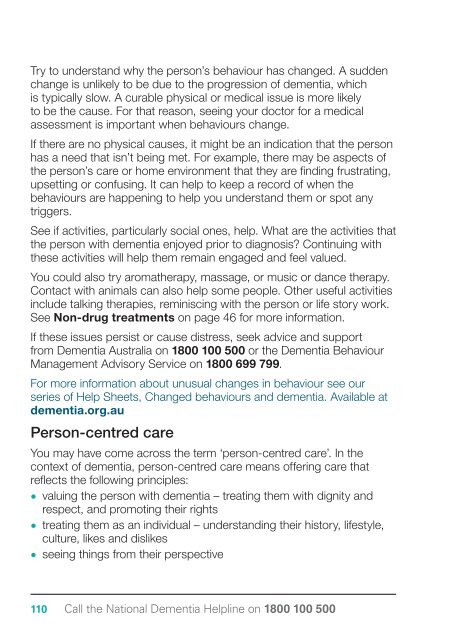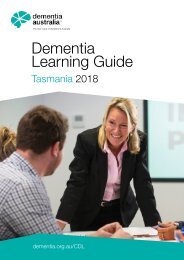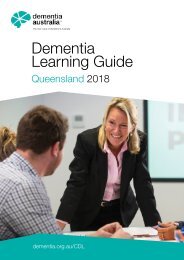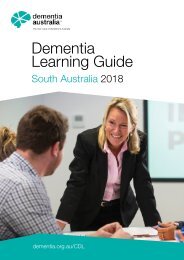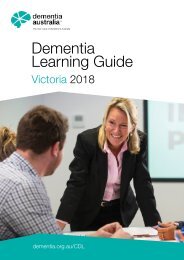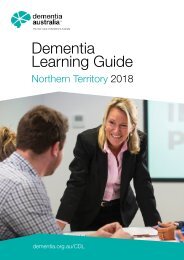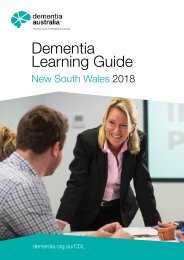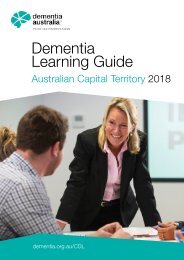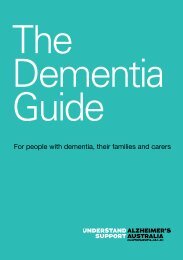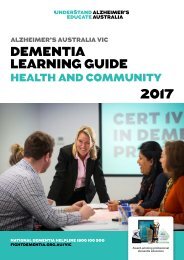Dementia Australia | The Dementia Guide
The Guide will also be used by the family and friends of someone with dementia, as it will contain information for anyone taking on a caring role. It will help people to understand more about dementia and the emotional impact of a diagnosis, the available drug treatments, and support and services that are available. It will include information about living well with dementia and about making plans for the future.
The Guide will also be used by the family and friends of someone with dementia, as it will contain information for anyone taking on a caring role. It will help people to understand more about dementia and the emotional impact of a diagnosis, the available drug treatments, and support and services that are available. It will include information about living well with dementia and about making plans for the future.
You also want an ePaper? Increase the reach of your titles
YUMPU automatically turns print PDFs into web optimized ePapers that Google loves.
Try to understand why the person’s behaviour has changed. A sudden<br />
change is unlikely to be due to the progression of dementia, which<br />
is typically slow. A curable physical or medical issue is more likely<br />
to be the cause. For that reason, seeing your doctor for a medical<br />
assessment is important when behaviours change.<br />
If there are no physical causes, it might be an indication that the person<br />
has a need that isn’t being met. For example, there may be aspects of<br />
the person’s care or home environment that they are finding frustrating,<br />
upsetting or confusing. It can help to keep a record of when the<br />
behaviours are happening to help you understand them or spot any<br />
triggers.<br />
See if activities, particularly social ones, help. What are the activities that<br />
the person with dementia enjoyed prior to diagnosis? Continuing with<br />
these activities will help them remain engaged and feel valued.<br />
You could also try aromatherapy, massage, or music or dance therapy.<br />
Contact with animals can also help some people. Other useful activities<br />
include talking therapies, reminiscing with the person or life story work.<br />
See Non-drug treatments on page 46 for more information.<br />
If these issues persist or cause distress, seek advice and support<br />
from <strong>Dementia</strong> <strong>Australia</strong> on 1800 100 500 or the <strong>Dementia</strong> Behaviour<br />
Management Advisory Service on 1800 699 799.<br />
For more information about unusual changes in behaviour see our<br />
series of Help Sheets, Changed behaviours and dementia. Available at<br />
dementia.org.au<br />
Person-centred care<br />
You may have come across the term ‘person-centred care’. In the<br />
context of dementia, person-centred care means offering care that<br />
reflects the following principles:<br />
• valuing the person with dementia – treating them with dignity and<br />
respect, and promoting their rights<br />
• treating them as an individual – understanding their history, lifestyle,<br />
culture, likes and dislikes<br />
• seeing things from their perspective<br />
110 Call the National <strong>Dementia</strong> Helpline on 1800 100 500


